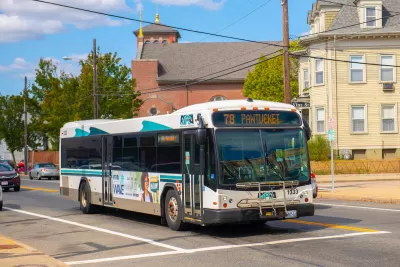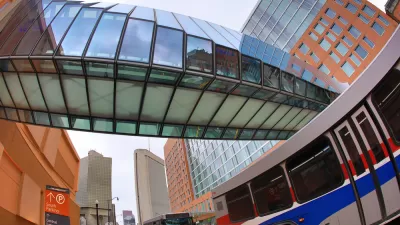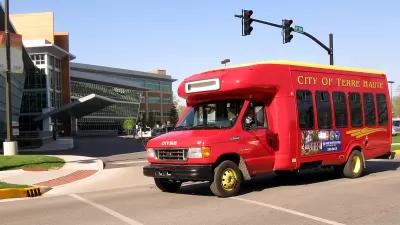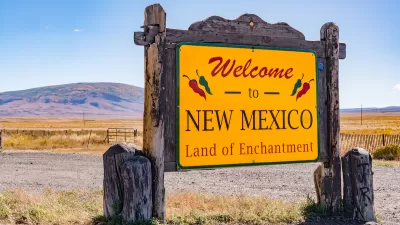The state’s public transit agency cited cost overruns and a looming ‘fiscal cliff.’

“The Rhode Island Public Transit Authority says it will extend a yearlong pilot program offering free bus service on one of its major routes for another month, but plans to discontinue the free rides in September,” according to an article by Christian Wade in The Center Square.
Wade explains, “the transit agency said the pilot program cost ‘exceeded’ the funding made available by the Legislature,” which allocated $2.5 million in federal American Rescue Plan Act funds to the program. “Ridership on the R-Line, which is the most used bus route in Rhode Island, increased 40% from last year during a fare-free pilot program, according to a report released by the agency earlier this year.” Meanwhile, the agency faces a projected $40 million deficit in the next fiscal year.
The movement to make public transit free gained steam during the pandemic, when agencies sought to bring back riders and eliminate contact points to encourage social distancing. “To date, at least 35 public transportation agencies have eliminated or reduced fares on their networks of trains, buses and subways, according to the American Public Transit Association.” However, advocates also point out that for transit-dependent riders, frequency and reliability often trump cost as the most important aspects of transit.
A bill introduced in Congress would distribute $25 billion to fare-free transit efforts. “In Congress, a group of Democratic lawmakers have reintroduced a bill that, if enacted, would provide $25 billion to states and transit agencies to support fare-free public transportation.”
FULL STORY: Rhode Island discontinues free bus service over costs

Study: Maui’s Plan to Convert Vacation Rentals to Long-Term Housing Could Cause Nearly $1 Billion Economic Loss
The plan would reduce visitor accommodation by 25,% resulting in 1,900 jobs lost.

North Texas Transit Leaders Tout Benefits of TOD for Growing Region
At a summit focused on transit-oriented development, policymakers discussed how North Texas’ expanded light rail system can serve as a tool for economic growth.

Why Should We Subsidize Public Transportation?
Many public transit agencies face financial stress due to rising costs, declining fare revenue, and declining subsidies. Transit advocates must provide a strong business case for increasing public transit funding.

How to Make US Trains Faster
Changes to boarding platforms and a switch to electric trains could improve U.S. passenger rail service without the added cost of high-speed rail.

Columbia’s Revitalized ‘Loop’ Is a Hub for Local Entrepreneurs
A focus on small businesses is helping a commercial corridor in Columbia, Missouri thrive.

Invasive Insect Threatens Minnesota’s Ash Forests
The Emerald Ash Borer is a rapidly spreading invasive pest threatening Minnesota’s ash trees, and homeowners are encouraged to plant diverse replacement species, avoid moving ash firewood, and monitor for signs of infestation.
Urban Design for Planners 1: Software Tools
This six-course series explores essential urban design concepts using open source software and equips planners with the tools they need to participate fully in the urban design process.
Planning for Universal Design
Learn the tools for implementing Universal Design in planning regulations.
Ascent Environmental
Borough of Carlisle
Institute for Housing and Urban Development Studies (IHS)
City of Grandview
Harvard GSD Executive Education
Toledo-Lucas County Plan Commissions
Salt Lake City
NYU Wagner Graduate School of Public Service





























